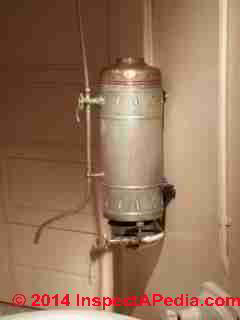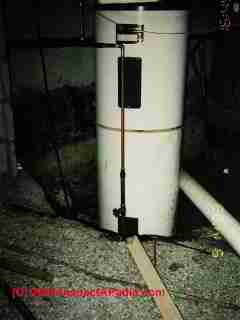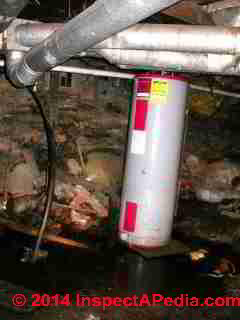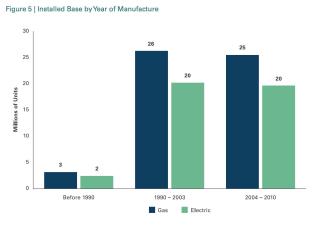 Life Expectancy of Water Heaters
Life Expectancy of Water Heaters
Average water cylinder life, factors that affect water heater life
- POST a QUESTION or COMMENT about how long a water heater can be expected to last
Life expectancy of a water heater or cylinder: this article describes the typical service life of a residential water heater - answering the basic question: how long will my water heater last?
We give typical water heater life expectancies, we list some of the factors that affect water heater life, we recommend maintenance steps to get the longest useful life of your water heater, and we discuss the relationship between water heater warranties and the actual life expectancy of the heater.
InspectAPedia tolerates no conflicts of interest. We have no relationship with advertisers, products, or services discussed at this website.
- Daniel Friedman, Publisher/Editor/Author - See WHO ARE WE?
How Long will My Water Heater Last? What Determines Water Heater Life?
 A typical gas or oil fired water heater life expectancy is from 8-12 years according to sources we've researched (and report here), and for tankless water heaters, 18-20 years.
A typical gas or oil fired water heater life expectancy is from 8-12 years according to sources we've researched (and report here), and for tankless water heaters, 18-20 years.
Home inspectors typically expect a generic water heater to last about ten years. However inspectors, plumbers, and homeowners have found 20 year old water heater or geyser models still going strong, while on occasion a newer model water heater (synonyms calorifier, cylinder) fails early.
The chronological age of a water heater (how long ago was it made) is hardly the only factor that determines how long the water heater will last. Our photo at left illustrates an antique gas-fired water heater installed in the Gaudi apartments in Barcelona, Spain. [Click to enlarge any image.]
Factors Affecting the Life of a Water Heater or Geyser
Here are some other factors that affect the life of a water heater:
- Corrosivity of the water supply vs water heater life - more corrosive water may shorten the water heater life or the life of its anode.
We discuss various tests of drinking water, including water corrosivity,
at WATER TESTS for CONTAMINANTS. In short, the chemistry of the water being heated affects the water heater life, and aggressive or corrosive water means shorter life for the water heater. - Mineral content in the water supply vs water heater life - water high in calcium and magnesium forms scale in the water heater, shortening its life.
If your water supply is high in minerals you may need a water softener
See WATER SOFTENERS & CONDITIONERS for details. - Water heater location / environment vs water heater life - if the water heater is located where it is subject to flooding (as in our photo at above-left) the system is going to be damaged, short-lived, and possibly unsafe as well.
Notice the multiple flood-lines on the water tank next to our client? Check out the shoes too. Don't wear white sneakers to inspect a crawl space.
 Our next photo (left) shows how a tall water heater was shoe-horned into a low crawl space by digging out a pit to allow the tank to stand upright. This heater is also likely to be exposed to flooding.
Our next photo (left) shows how a tall water heater was shoe-horned into a low crawl space by digging out a pit to allow the tank to stand upright. This heater is also likely to be exposed to flooding.
We have also seen water heaters placed horizontally to fit into a tight crawl space - a possibly dangerous installation. Unless the manufacturer has specifically designed a water heater to mount horizontally there is risk that the tank or other components will not be properly supported and the system will be damaged and unsafe.
In sum, improper location or improper position of a water heater, such as mounting some water heaters horizontally or locating a water heater in a flood prone location or where it can't be properly serviced or vented can lead to early failure of the heater as well as voiding the manufacturer's warranty.
- Water heater installation details vs water heater life - improper installation of the water heater, or improper fuel or water piping connections or inadequate chimney venting on fossil-fuel fired water heaters can lead to safety problems or leaks and early heater failure.
- Water heater maintenance vs water heater life - flushing mineral debris and dirt from a water heater can significantly extend its life as well as increase the quantity and temperature of domestic hot water the heater provides. If your water heater is making noises
See WATER HEATER NOISE DIAGNOSIS, CURE since you probably need to de-scale the heater bottom.
and
See WATER HEATER SCALE - De-Liming Procedure which are discussed at WATER HEATER NOISES. - Water heater anode replacement vs water heater life - the sacrificial anode protects a water heater tank from corrosion. Depending on the chemistry of your water supply, the anode may need to be replaced every few years or even more frequently. If suddenly your hot water (but not your cold water) smells like rotten eggs, the problem may be with a corroded sacrificial anode.
See SEWER GAS ODORS
and
see CHECK THE SACRIFICIAL ANODE & DIP TUBE OF YOUR WATER HEATER TANK - Water heater tank type vs water heater life - most water heaters use a glass or porcelain liner which, along with
the WATER HEATER SACRIFICIAL ANODE,
help protect the tank from corrosion. The construction of the water tank, methods and materials used affect the life of the tank, burner, and controls.
Look at the water heater warranty period; a longer warranty probably means a more durable water heater tank.
Some water heaters that used a copper tank also have had reports of very longlife, such as older Hoyt water heaters cited
at HI TEST HOYT WATER HEATER AGE - Temperature setting of the water heater vs water heater life
runing a water heater at higher temperatures may shorten its life and increase the corrosivity of water or may increase the deposits of lime-scale. - Quantity of hot water used vs water heater life - using more hot water increases the duty cycle of the water heater and exposes the tank to extra risk of corrosion.
The temperature to which the water heater is required to heat the hot water may also be a factor in tank or burner or other water heater part life.
The quantity of hot water used, which determines how hard it works, is called the duty cycle or level of usage of the water heater (more use = shorter life). - Water heater warranty periods vs water heater life - the warranty for a given model water heater is also a predictor of how long the manufacturer expects the tank to last. (A grouchy friend opined to the author that all of the tanks are the same, but the water heater price is higher on a water tank with a longer warranty period. We have not found data to support this view.) We discuss water heater warranties in more detail just below.
- Not enough hot water? If your water heater seems to be working ok but you just never have enough hot water,
see HOT WATER IMPROVEMENTS
and HOT WATER QUANTITY IMPROVEMENT.
Also see WATER HEATER LIFE EXPECTANCY COMPARISONS for a short list of other factors that determine the life expectancy of a water heater.
What are the Typical Terms of Water Heater Warranties
 Types of water heater tank and water heater warranty - modern "glass lined" water tanks are coated to resist corrosion.
Types of water heater tank and water heater warranty - modern "glass lined" water tanks are coated to resist corrosion.
The manufacturer's warranty period as well as a description of what is covered under the warranty are clues both to the importance of water heater maintenance and hints about how long the company expects their water heater tank to last.
Typical water heater warranty periods for a water heater installed for use by a single family are 6-years, 9-years, or 12-years.
Tankless water heaters have a typical life expectancy of more than 20 years.
The warranty period of a water heater may be encoded in its model or serial number.
For example Lochnivar water heaters include a model number prefix that determines whether the heater is warranted for six years or for ten years. If the water heater is in any other use than one-family residential, the heater is warranted for one-year on parts and three years on the tank itself.
Watch out: if the water heater tank leaks and fails before the end of the warranty period, if the system has not been properly installed or maintained the warranty may be void. Water heater warranties typically indicate that the tank is warranted against leaks due to rust, corrosion, or chemical action of the water but the warranty will exclude a tank failure due to scale.
Our photograph above shows a water heater installed in an area subject to recurrent flooding.
This heater will have a short life, may be dangerous (risk of explosion from a combination of pressure, rust, and flooding), and is almost certainly not going to be warranted by the maufacturer if they see how it was installed.
Watch out: as well to perform the manufacturer's recommended water heater maintenance chores. Flushing a water heater on schedule, checking and replacing the water heater anode when required, and attention to the water quality in the home - corrosivity and mineral level for example, can make a significant difference in the water heater's life.
Also see WATER HEATER LIFE EXPECTANCY COMPARISONS for a comparison of the typical life expectancy of different types of water heaters or methods of producing domestic hot water.
Just below at "Continue reading" are key water heater maintenance articles that can significantly extend water heater life.
Research on Water Heater Life Expectancy
 Indirectly we can infer some interesting information about actual water heater life for the United States from the U.S. DOE Energy star report cited below.
Indirectly we can infer some interesting information about actual water heater life for the United States from the U.S. DOE Energy star report cited below.
[Click to enlarge any image]
This graph, excerpted from that document shows us that in 2010,
- 26 million gas-fired water heaters in the U.S. were manufactured between 1990 and 2003, making them 7 to 20 years old
- 25 million gas fired water heaters in the U.S. were manufactured between 2004 and 2010, making them 6 years old or newer
- 20 million electric water heaters in the U.S. were manufactured between 1990 and 2003, making them 7 to 20 years old
- 20 million electric water heaters in the U.S. were manufactured between 2004 and 2010, making them 6 years old or newer
- 2-3 million of water heaters (electric or gas respectively) in the U.S. were manufactured before 1990, making them more than 20 years old.
Interpreting this data to make a statement about water heater life, we have made up the table below:
Table of U.S. Water Heater Actual Life by Fuel Type in 2010 |
|||
| Water Heater Energy Source |
Age of Water Heaters |
Million Water Heaters Installed |
Percent |
| Gas-Fired | >20 years | 3 | 6 % |
| Gas-Fired | 7-20 years | 26 | 48 % |
| Gas-Fired | 0-6 years |
25 | 46 % |
| Electric | >20 years | 2 | 5 % |
| Electric | 7-20 years | 20 | 47.5 % |
| Electric | 0-6 years |
20 | 47.5 % |
| Oil-Fired (no data in the DOE report) | |||
|
|||
Notes to the table above
Source: 2010 WATER HEATER MARKET PROFILE [PDF] (2010) U.S. Department of Energy, includes only gas and electric water heaters
Other water heating energy sources such as wood and solar water heating are not included in this data.
Oil fired water heaters are used in the U.S. primarily in the northeast. Still 42% of water heaters are gas in New England and 58% of water heaters are gas-fired in the Middle Atlantic states. Much lower percentages of water heaters are gas-fired in the East-South-Central and South Atlantic US.
This table assumes that water heaters are principally installed because a prior heater has reached the end of its life. This assumption is inaccurate insofar as it does not reflect the installation of water heaters as the first heater installed, such as in a newly-constructed home.
For example, in December 2017 there were 1192thousand housing starts compared with 41,820 thousand housing starts in the UK and 217 thousand housing starts in Canada. - source: Trading Economics, retrieved 2018/02/05, original source https://tradingeconomics.com/united-states/housing-starts
- Aguilar, C., D. J. White, and David L. Ryan. "Domestic water heating and water heater energy consumption in Canada." Canadian Building Energy End-Use Data and Analysis Centre (2005).
- Dubey, Swapnil, and G. N. Tiwari. "Thermal modeling of a combined system of photovoltaic thermal (PV/T) solar water heater." Solar energy 82, no. 7 (2008): 602-612.
- 2009 WATER HEATER MARKET PROFILE [PDF] (2009) U.S. Department of Energy, retrieved 2018/02/05, original source: https://www.energystar.gov/ia/partners/prod_development/new_specs/downloads/water_heaters/Water_Heater_Market_Profile_Sept2009.pdf
- 2010 WATER HEATER MARKET PROFILE [PDF] (2010) U.S. Department of Energy, retrieved 2018/02/05, original source: https://www.energystar.gov/ia/partners/prod_development/new_specs/downloads/water_heaters/Water_Heater_Market_Profile_2010.pdf
- Hoeschele, M., D.Springer, A German, J. Staller, Y. Zhang, Strategy Guideline: Proper Water Heater Selection, [PDF] (2015) U.S. Department of Energy & Alliance for Residential Building Innovation ARBI
- Kalogirou, Soteris. "Thermal performance, economic and environmental life cycle analysis of thermosiphon solar water heaters." Solar energy 83, no. 1 (2009): 39-48.
- Koroneos, Christopher J., and Evanthia A. Nanaki. "Life cycle environmental impact assessment of a solar water heater." Journal of Cleaner Production 37 (2012): 154-161.
Abstract
The technical and environmental performance of a solar water heater (SWH) is examined using the method of life cycle assessment (LCA). The present LCA study quantifies the environmental benefits of the installation of a SWH with electricity as auxiliary for domestic use in the city of Thessaloniki. Solar thermal heating produces no emissions during operation but some small levels of emissions are produced during the manufacture and installation of components and systems.
This work examines the manufacturing stages of the SWH and records resource consumption and waste streams to the environment.
The system boundary includes the production of raw materials such as steel, glass, copper, aluminium, glass fibber and polyurethane insulators, the manufacturing of the various parts of the SWH such as the solar collector and the heat storage tank, and finally the assembly process. The functional unit chosen is 1 MW of produced hot water.
The environmental impacts taken into consideration in the study, are the greenhouse effect, ozone depletion, acidification, eutrophication, heavy metals, carcinogens, winter smog and summer smog. The system can provide 1702 kWh year−1 and the solar contribution is 58.5%. The financial characteristics of the system investigated give life cycle savings equal to 4280.0 and pay-back time equal to 5 years.
...
Reader Comments, Questions & Answers About The Article Above
Below you will find questions and answers previously posted on this page at its page bottom reader comment box.
Reader Q&A - also see RECOMMENDED ARTICLES & FAQs
On 2019-11-07 by (mod) - how to find the age of my Pro Max water heater or an Hoyt water heater
Judy
Pro Max is an A.O. Smith water heater brand. Find AO Smith at WATER HEATER AGE & MANUALS https://inspectapedia.com/plumbing/Water-Heater-Age-Manuals.php
I'll see what else I can find and post here.
On 2019-10-21 by Judy
I have a pro max water heater. I am the 2nd owner and I would like to know the age of the heater. the serial number is LOGAD43704. There were no MMYY letters. How long should I expect it to last"
My whole housing area of over 900 homes has a water softening system.
On 2017-06-28 by Richrd
HOyt copper water heater serial no 7733 Anyone know age? Lived in house since 1966 and it just quit
On 2017-01-08 by Anonymous
If the water heater fails, are there shutoffs that will minimize damage or does the heater continue to fill and leak until discovered?
On 2016-11-23 by (mod) - reader wants to ban water softeners
Greg,
Thank you for the interesting view and opinion.
Unfortunately it's hard water that ALSO destroys Plumbing Systems by plugging pipes and in water heaters by forming scale that encourages burn out of the water heater bottom, or in an electric water heater scale formation on the elements.
So we are left with a dilemma. If we don't treat hard water in a building we could face the need to replace all of the building Plumbing piping.
I think for the situation that you described it would make sense to check carefully for at least two conditions
First we should check the crow 70 index of the water supply. If you live in an area where the water is highly corrosive, then treatment for the water corrosivity / pH is needed.
Second, it would make sense to measure the water hardness and then to be sure that the water softener is correctly adjusted. Excessive softening of the water May indeed be a factor in corrosion.
On 2016-11-22 by Greg Hahnel
I bet if water softeners were banned all together we would start to see tank lasting 19 to 24 years. I have had so many customers complain that they have gone through three water heaters in 22 years, so I usually tell them that it is because they use a water softener. Any tiny cracks in the glass lining will start rusting the tank from the inside out, as the salt dramatically speeds up the corrosion process.
As for calcium and lime, we live in a zone which has hard water.
I have removed hundreds of drain cocks to speed up the tank draining process, and have yet to see much if any build up in any older tanks.
A different story if you are on a well pump system, you will likely end up with a lot of silt and sediment in the bottom of the tank.
The bottom line in my professional opinion is the salinated water from the softening process causes water heaters to rust and fail prematurely. No matter what the company selling these products claim about prolonging the life of your plumbing system and appliances, softeners often cause more damage than is claimed they will prevent.
High water pressure due to a check valve at the main water supply will prematurely kill a tank as well.
On 2016-08-17 by (mod) - replace "brain" of 9-year old gas water heater rather than buy new?
Lanette
The question depends on not just age - we don't replace everything that's old - after all, I'm old but still ticking.
Rather the replace or repair question depends on
1. the nature of the damage to the existing heater: if the heater tank is leaky then it's shot and the whole heater needs replacement; if the repair needed is simply a TP relief valve or a control valve or perhaps a burner igniter or gas valve, the cost of those is rather modest and is often worth doing.
2. compare the estimate of the total repair bill cost with the estimate of a total replacement of the heater. If the repair bill is a big % of the new heater cost then a new heater may make sense.
3. are there other reasons for wanting a new water heater (water cylinder or calorifier depending on where you live)? For example if you want a larger capacity heater then go ahead and replace it now.
On 2016-08-16 by Lanette
Dors ot make sense to replace "brain" of 9-year old gas water heater rather than buy new?
On 2014-07-31 by (mod) - Replacing a Lochinvar water heater with Bradford White as a "precaution"
Doug I don't have an informed answer to what is basically opinion.
Some water heaters last well beyond their warranty period in years. In a home where a leak at the water heater would be a catastrophe there are drain pan systems that can catch leakage.
In a business where absolute 100% reliability of hot water is a make-or-break concern, installing a backup heater that can take over when the first one fails is another strategy.
Otherwise, watch for leaks at an old water heater as it'd be leak damage and rot or mold contamination that might involve extra expense.
On 2014-07-3 by Doug
I have a lochnivar water heater that is 11 1/2yrs old runs and looks good that I am replacing tommorrow with a Bradford white just as a precaution because of age. do you think I should wait another year or two
...
Continue reading at WATER HEATER FLUSH PROCEDURE or select a topic from the closely-related articles below, or see the complete ARTICLE INDEX.
Or see these
Recommended Articles
- ANODES & DIP TUBES on WATER HEATERS
- HOT WATER IMPROVEMENTS - home
- WATER HEATER AGE & MANUALS - free PDF downloads of water heater IO Manuals
- WATER HEATER COMPARISONS, PROPERTIES
- WATER HEATER FLUSH PROCEDURE
- WATER HEATER LIFE
- WATER HEATER RESET BUTTONS & CONTROLS
- WATER HEATER OPERATING COST COMPARISON
Suggested citation for this web page
WATER HEATER LIFE at InspectApedia.com - online encyclopedia of building & environmental inspection, testing, diagnosis, repair, & problem prevention advice.
Or see this
INDEX to RELATED ARTICLES: ARTICLE INDEX to WATER HEATERS
Or use the SEARCH BOX found below to Ask a Question or Search InspectApedia
Ask a Question or Search InspectApedia
Try the search box just below, or if you prefer, post a question or comment in the Comments box below and we will respond promptly.
Search the InspectApedia website
Note: appearance of your Comment below may be delayed: if your comment contains an image, photograph, web link, or text that looks to the software as if it might be a web link, your posting will appear after it has been approved by a moderator. Apologies for the delay.
Only one image can be added per comment but you can post as many comments, and therefore images, as you like.
You will not receive a notification when a response to your question has been posted.
Please bookmark this page to make it easy for you to check back for our response.
IF above you see "Comment Form is loading comments..." then COMMENT BOX - countable.ca / bawkbox.com IS NOT WORKING.
In any case you are welcome to send an email directly to us at InspectApedia.com at editor@inspectApedia.com
We'll reply to you directly. Please help us help you by noting, in your email, the URL of the InspectApedia page where you wanted to comment.
Citations & References
In addition to any citations in the article above, a full list is available on request.
- Scott C. LeMarr has provided his file of keys to decode Water Heater Age from the data provided on the manufacturer's equipment labels. Mr. LeMarr is a professional home inspector, Certified Professional Inspector/President, MASTER Indoor Environmental Specialist (MIES). Vice President of Wisconsin NACHI. He and his company, Honest Home Inspections [ Website: www.HonestHomeInspections.com ], LLC. can be reached at 262-424-5587 or by email to scott@honesthomeinspections.com
- Carson Dunlop, Associates, Toronto, have provided us with (and we recommend) Carson Dunlop Weldon & Associates'Technical Reference Guide to manufacturer's model and serial number information for heating and cooling equipment ($69.00 U.S.). Technical Reference Guide, Carson Dunlop Weldon & Associates, Ltd., 120 Carlton St. Suite 407, Toronto, Ontario, M5A 4K2 Canada, ISBN 1-895585-90-2 165pp.
- G.E. Water Heater warranties and other water heater information can be found online at geappliances.com
- Lochnivar or some vendors of Lochnivar water heaters provide an online copy of its water heater warranty (01/26/2009)
- In addition to citations & references found in this article, see the research citations given at the end of the related articles found at our suggested
CONTINUE READING or RECOMMENDED ARTICLES.
- Carson, Dunlop & Associates Ltd., 120 Carlton Street Suite 407, Toronto ON M5A 4K2. Tel: (416) 964-9415 1-800-268-7070 Email: info@carsondunlop.com. Alan Carson is a past president of ASHI, the American Society of Home Inspectors.
Thanks to Alan Carson and Bob Dunlop, for permission for InspectAPedia to use text excerpts from The HOME REFERENCE BOOK - the Encyclopedia of Homes and to use illustrations from The ILLUSTRATED HOME .
Carson Dunlop Associates provides extensive home inspection education and report writing material. In gratitude we provide links to tsome Carson Dunlop Associates products and services.

